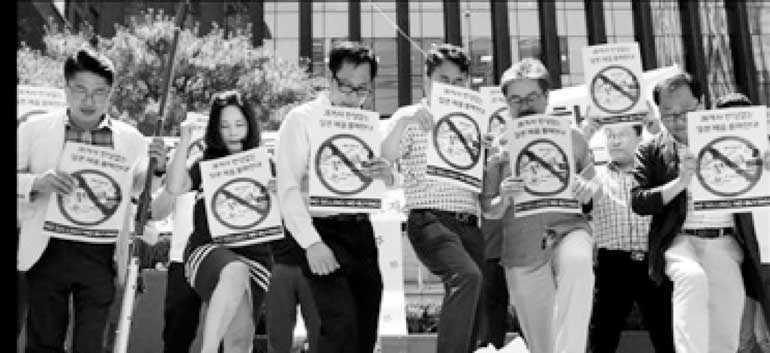Thursday Feb 26, 2026
Thursday Feb 26, 2026
Saturday, 6 July 2019 00:00 - - {{hitsCtrl.values.hits}}

South Korean merchants step on boxes bearing logos of Japanese products during a rally to declare a boycott of Japanese goods in Seou - Reuters
SEOUL (Reuters): Calls in South Korea for a boycott of Japanese goods in response to Japanese restrictions on the export of high-tech material to South Korea picked up on Monday, as a dispute over compensation for forced wartime labour roiled ties between the US allies.
The dispute is the latest flashpoint in a relationship long over-shadowed by South Korean resentment of Japan’s 1910-1945 occupation of the Korean peninsula, in particular South Korean “comfort women”, a Japanese euphemism for women forced to work in Japanese military brothels before and during World War Two.
The latest bitterness over forced labour could disrupt global supplies of memory chips and smartphones. Samsung Electronics Co and SK Hynix Inc – the world’s top memory chipmakers, and suppliers to Apple and China’s Huawei Technologies – could face delays.
“A boycott is the most immediate way for citizens to express their anger,” said Choi Gae-yeon of the activist group Movement for One Korea, that staged protests in front of a Japanese car dealership and a retailer in Seoul this week. “Many people are angry at the attitude of the Japanese government.”
The row over forced labour exploded last year when a South Korean court ordered Japan’s Nippon Steel & Sumitomo Metal Corp and Mitsubishi Heavy Industries Ltd to pay hundreds of thousands of dollars to South Korean plaintiffs.
Japan maintains that the issue of forced labour was fully settled in 1965 when the two countries restored diplomatic ties, and has denounced the ruling as “unthinkable”.
Japan said on Monday it would tighten restrictions on the export of high-tech materials used in smartphone displays and chips to South Korea in connection with the dispute.
The restrictions came into effect on Thursday, fuelling calls for retaliation in South Korea.
Nearly 25,000 people had by Friday signed a petition posted on the South Korean presidential office website calling for a boycott of Japanese products and for tourists not to visit.
The government must respond to a petition that gets 200,000 signatures in a month. Some Korean social media users posted “Boycott Japan” messages and shared a link to a list of Japanese brands that could be boycotted, including Toyota Motor and Fast Retailing’s Uniqlo.
“Japan boycott movement” was among the most searched-for terms on South Korea’s main online search engine Naver.